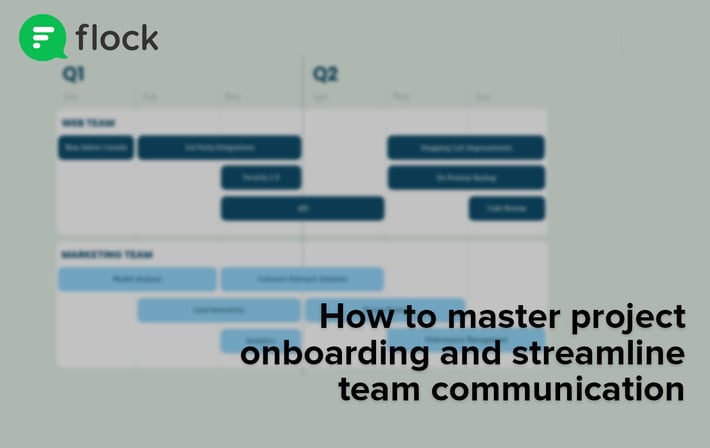I just wrapped up my first week at Flock, a team collaboration software startup in hypergrowth mode, and it has been a surprising and emotional journey!
Here are my thoughts from my first week at a startup…
Day 1: Everything is new

Most newbies to a company attend an onboarding session where the complexities of business get distilled into an hour. I frantically took notes during my onboarding session, but they weren’t as useful as I thought they’d be. Receiving a deluge of information without having an insider’s context means you don’t retain as much as you would like. Onboarding is always tough for any business to execute, and my take is that while face-to-face onboarding is crucial, having a pre-recorded onboarding presentation would have been very helpful for me to refer back to as I got more up to speed.
After onboarding, we headed to our desks to meet the team and to unbox our new equipment. Unboxing was a ton of fun until I got to the dreaded hook-up-the-cables stage. Multiple colleagues came over to help me and my fellow new hires hook our machines up to the external monitors, keyboards, and docks. It took us over an hour to set things up, and that is kind of embarrassing given we’ve all been working in tech for years! Technical difficulties always seem to be exacerbated on the first day on the job. I have no good solutions to this problem, especially for small companies without an IT department, besides being kind to new colleagues and helping them out when they can’t seem to connect to the WiFi.
I spent the rest of my day poking around systems, getting access to various tools that colleagues outlined in my starting doc. The team was incredibly professional with respect to the starting doc, someone even printed a copy of it and placed it on my desk! Once I was online, I could see a list of key team members I should meet, log into the tools/systems we use, and view videos and articles flagged by teammates. Best of all, I could review my 15, 30, and 90-day goals, which ensured that I knew what success looked like as I ramped up.
Day 2: Feeling all the feelings

The reality of being new to everything hit me on Day 2. I started the day trying to read up on my new company’s operations and decipher performance reports. I attended meetings but didn’t really know what was happening. I had to ask colleagues who was who and what function they served. I didn’t realize how much I would miss the five years of institutional knowledge I had built up at my former company, HubSpot. I went from knowing nearly all the history of the marketing team and the intricacies of our data to knowing absolutely nothing. It was jarring.
Then, as I struck up conversations with my new teammates (who, by the way, were incredibly warm and welcoming), I felt waves of loneliness set in. I missed my old team and the easy camaraderie we’d built over the years. I knew their kid’s names, their pet’s names, and their favorite vacation spots. None of those past relationships was work, and now, all of a sudden, it was. It dawned on me that I was really starting over. I had expected to feel clueless, to experience imposter syndrome, but I hadn’t factored in loneliness. I thought I was prepared, but nothing could have prepared me for the emotional work starting from scratch required. I went home that night feeling pretty low.
Day 3: Finding opportunities

I shuffled into the office on Day 3, not knowing what to expect. I had a team meeting and an intro call with a teammate. I finally met everyone in the team meeting, putting faces to names I’d been hearing. My subsequent conversation with my teammate was warm and friendly. We talked about our personal interests, and he caught me up on work that had been done.
Armed with that knowledge, I started investigating gaps and opportunities for the content team. I pulled historical data and started building my knowledge. My spirits rose because with each discovery I realized ‘Oh! This is what I was hired for.’ I knew I could help, and I could already see the team’s potential. I got excited about what we could do. And suddenly, it was the end of the day. I headed home, feeling completely different from the day before.
Day 4: Making friends

I had more 1:1 meetings scheduled on Day 4, including my second check-in of the week with my VP. Having multiple check-ins with him helped me feel supported in my first week. Facetime, in-person or virtual, can be a small thing but makes an outsized impact. No matter how tenured you are, you can’t help but feel that you are flailing when you start a new job. Knowing that your manager has your back builds on your sense of psychological safety, which is crucial as you try to figure things out.
Honestly though, what really started making feel like I was hitting a groove was everyone else I met with. As I spoke with other teammates, I was consistently greeted with warm welcomes and the same response—they were excited to work with me and wanted to help me succeed. There’s no better way to make a newcomer feel welcome than being shown a culture of friendliness and openness.
In general, I’m people-focused and social at work (as well as impatient) so I wanted to kickstart the ‘get to know each other’ process. I borrowed an idea from my former teammate, Ari Plaut, and started asking a ‘Question of the Day’ in our team channel in Flock as a way to learn more about my new teammates. In a few messages over the next 3 days, I heard about their hobbies, favorite foods, and most beloved books. Later on, someone noted that the ‘Question of the Day’ sparked the most engagement they’d ever seen on that channel, so remember that you can indeed make an impact, even in early days.
I also shared my ‘User Guide’—which is basically a personal FAQ document—so folks across the organization could get to know me and understand my working style, preferences, and self-described strengths and weaknesses. In a subsequent 1:1, a team member mentioned that she’d discussed my user guide with a colleague and told me it helped her get a sense of me before we were scheduled to meet.
Day 5: Hey, I slay!

By Day 5, I was feeling pretty good. I knew I had chosen a great company with great people. I knew there was meaty work I could tackle. I felt a little like Beyonce. Don’t get me wrong, there were still roadblocks in my line of sight. I was still trying to decipher company-specific acronyms, struggling to document the org structure, and saving every link to key reports and content I knew I’d need to refer back to. But I felt like I’d come a long way since my first day, and especially after my emotional second day. I knew I could slay.
One of Flock’s core values is to enable businesses by facilitating conversation, and I wanted to exemplify it as best I could from the start. I ended my first week by recording a Loom video to introduce myself to folks I haven’t met yet and sum up my initial experience. The Flock team is distributed across continents, and I strongly felt that I should make myself known to everyone and share first thoughts, no matter how mundane I think they may be. I did this knowing how much I appreciated hearing from my leadership team in the past. Their transparency exposed me to projects and initiatives I had no line of sight over, and would otherwise never have known about if they hadn’t taken the time to share.
This wraps up my first week at a startup experience. Thinking back, how did you feel when you started at your company? Do you think my experience is universal across startups, small businesses, and big companies?
Mimi’s recommended resources for onboarding teams:
- Record an onboarding session on Loom for new hires to refer back to
- Write a onboarding doc that outlines:
- Key people to meet
- Links to needed software
- Links to internal videos and articles
- Links to key reports, dashboards, metrics that guide the business
- 15 day, 30 day, and 90 day goals
- Hold multiple check ins with them to see how they’re progressing and what they’re feeling
- Create a Jargon Glossary to help new hires decipher internal specific phrases
- Provide an org chart if your organization is distributed or fairly large
Mimi’s suggestions for someone starting a new job
- Write a user guide that outlines your working style, how you like to give and receive feedback, your strengths and weaknesses, and any other elements you would want your colleagues to know about you.
- Record a video of your first impressions
- Schedule as many meetings as you can with folks you’ll be working with.
- Expect to feel disoriented or even lonely. Acknowledge your feelings, give yourself space and time to sort through them, and lean on your network to help you through it.





